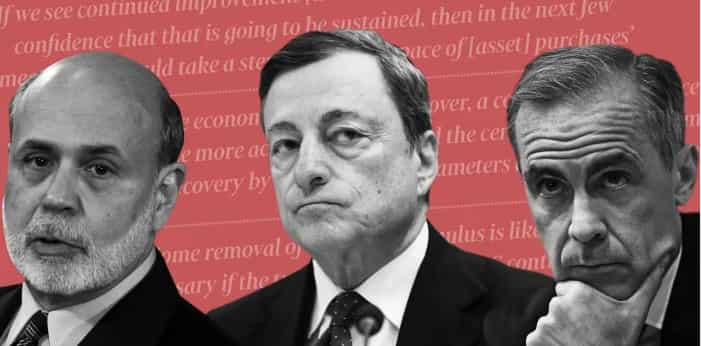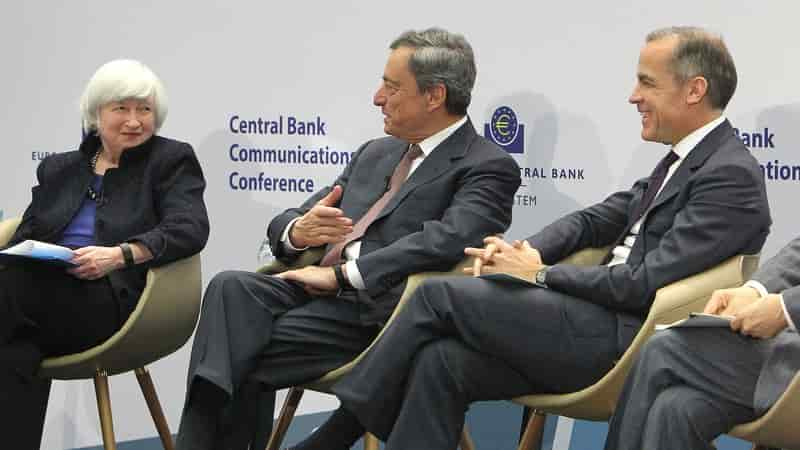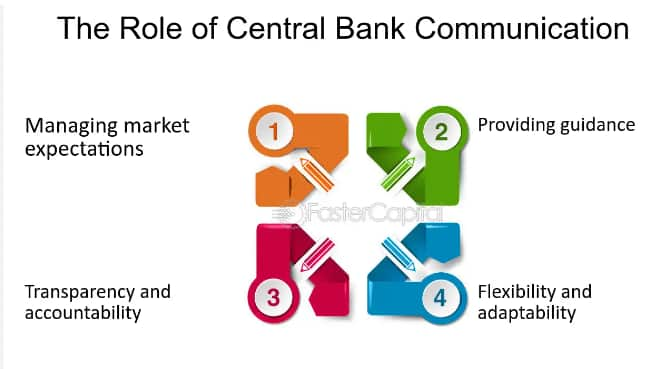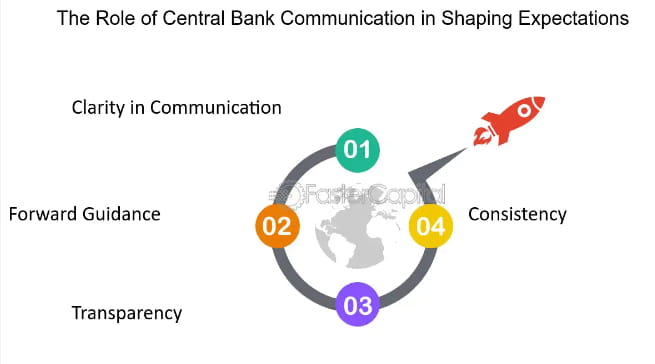Contents
There has been loads of philosophic, social and economic discussions from the ancient Rome to our modern world about what the root of power and wealth is. However, after 2000’s and especially along with the emerging of the globalism, it has become a widely-accepted fact that if you want to be highly-respected and powerful country you have to make your economic structure strong, stable and sustained. So, it could be understood that power and wealth are directly related to size, management vision and effectiveness for an economy. Central Bank communication which is main subject of this essay should be consider in this concept.

After this important finding and detection, it has been become very clear that in order to make your economic structure more powerful and become a power and wealthy country/nation, first of all you have to create accurate economic policy, set of tools and management also. Unfortunately, especially during recent year’s importance of communication have been just started to realize. “After years of intentional opacity, central banks in advanced economies have exerted significant efforts to enhance the transparency of their communication to market participants. (Mishkin, 2007)”
According to Bernanke (2004) central banks in developed economies often use their official communication to influence market participants’ views about the likely path of future policy actions, and to align these views to their own. Communication can be used to improve the understanding of long-run policy objectives, helping central banks to achieve their long-term goals, most notably anchoring inflation expectations.
Why Does Central Bank Communication Matter?
In short, it might be said that in the modern economics even though there are several tools to manage and operate economic structure of a country, generally governments or central banks use two main policy (Monetary and Fiscal Policy) to monitor and stabilize it. Even they are very important topics in the successful economy management, because main target and topic of this essay is directly related to Monetary Policy and Central Bank Communication, it will not be discussed here what Fiscal Policy is and what kind of tools it has.
In the theory of modern economics central banks have some conventional tools which are used in order to adjust quantity of money in the economy most of the time. For example, if economy is in expansion period and there is inflationist pressure, central banks immediately implement contractionary monetary policy via its tools and balance the economy again or vice versa.

In this context, before analysing relationship between communication of central banks, expectations and monetary policy, we must look at the conventional tools of central banks briefly.
- Open market operations,
- Reserve requirements,
- The discount rates
What Is Central Bank Communication? Expectation Relation!
There have been different views about expectations and their effect on monetary policy or even economy policy in the economics theory during the recent years. Along with that it is widely-accepted that especially after emerging of the rational expectations theory and exploring of the internet, the importance of expectations and knowledge in the economic literature have increased sharply.
Even there are some discussions about if the expectations are measurable or not, most of the economists accepted importance and the role of expectations in the modern economics theory. In this scope, it should be emphasized that one of the most important and effective ways to manage expectations is style and rhetoric of communication of the central banks. Due to fact that economic actors want to learn and understand near future actions of central banks, communication has been getting more and more important.
If there is not transparency, communication and predictability in a country, neither foreign investors nor domestic investors will be eager for investing that country. It must be stressed that first step of transparency in modern world should be accurate central bank communication.
At this point, we would like to make another quote. “It is important for public to understand central bank’s actions, to the greatest extent possible, not only for reasons of democratic legitimacy, I though this is an excellent reason itself, given that central bankers are granted substantial autonomy in execution of their task but also in order for monetary policy to be most effective. For not only do expectations about policy matter, but, at least under current conditions, very little else matters. The public’s understanding, not only of what the central bank is currently doing, but of what it can be expected to do in the future, is critical for the effectiveness of policy.” (Woodford, 2005)

How Central Bank Announcements Affect Financial Markets
In 1980’s central banks were known of their silence and there was no signal or tips about near future targets or intentions of their policies. According to Woodford (2005) one of the most notable changes at the Federal Reserve during the tenure of Alan Greenspan as Chairman of the Board of Governors has been a steady increase in the FOMC’s willingness to talk openly about the policy decisions that it has made and those it is likely to make in the future. Before the 1990s, central banking was shrouded in mystery, at the Fed as elsewhere.
The title of William Greider’s 1987 bestseller about the Fed “Secrets of the Temple” gives an idea of the common perception of the institution at the beginning of the Greenspan era. This “mystique” of central banking was jealously guarded by central bankers as essential to their success.
It should be emphasized again, even there are a lot of instruments in management of monetary policy, unless taking central bank communication into consideration, the related country will not keep up with requirements of the modern era in terms of economic structure and success. Apart from conventional tools of central banks like open market operations, reserve mechanism and the discount rate, also predictability, transparency, clarity and accountability should be most important and well-known characteristics in order to be successful at monetary policy.
Apart from being predictable and transparent, modern central banks have realized that they have a very powerful instrument (accurate and effective communication) during the recent years even though it is a little bit late. According to Blinder, (2009) almost all central banks nowadays inform the public about their monetary policy decisions immediately or with very short delays.

Mario Draghi Effect in the 2008 Financial Crisis
However, this was not always the case. Prominently, the Federal Reserve only began announcing changes in its target federal funds rate immediately after FOMC meetings in February 1994. Before that, markets had to infer the intended funds rate from subsequent open-market operations–until the decision was published after the next FOMC meeting.
In 2008 and after especially bursting of economic crisis, the governor of European Central Bank Mario (Super) Draghi and governor of FED Ben Bernanke were well-known for their powerful and effective communication with markets and all economic actors which were affected by the crisis. Moreover, due to fact that they announced their policy targets and supports for the markets in periodically, it was said that their correct messages to markets and signals about continuity of quantitative easing made power of crisis softer at that time.
Artificial Intelligence and Future of Central Bank Communication
In the global world, along with power of technology, accurate communication has also become an important instrument for economy managements and central banks. Central banks which want to direct and operate markets and decision-makers accurately and effectively have started to use expectation management as a powerful and productive tool via communication. They have been using techniques of giving correct signal about near future policies or even policy rates also in order to manage the expectations of economic actors.

First of all, as the committee or the governor of central banks should make markets what their near future intentions are by giving correct message to them. Secondly it is obvious that communication does not mean only talking, but also talking optimally and effectively. By giving a lot of technique or theoretical information you must not make ordinary people more complicated also while you are creating a communication way for your monetary policy. For example, in the 2008 Crisis, Ben Bernanke always had clear and self-confident stance and he gained credibility. Therefore, owing to his accurate communication he could manage the expectations and his monetary policy got more effective.
In conclusion, it can be said that power of communication in the monetary policy have been explored and realized after 2000’s with internet revolution but especially after 2008 crisis. Appearance of powerful leadership in monetary policy via communication and expectation management by Mario Draghi and Ben Bernanke, power of communication has gained more and more attention and respect as a part of tools or instruments of monetary policy.
Owing to developing of technology with artificial intelligence (AI), pandemic and its future impacts and raising globalism will be able to make communication and expectation management of central banks the most important and even the most effective monetary policy instrument in the near future. Finally, it should be noted that as technology develops, the issue of central bank communication will become more important. Additionally financial literacy and personal finance management will be more important.
